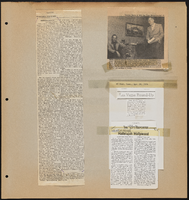Search the Special Collections and Archives Portal
Search Results

Transcript of interview with Walter Dane by Ann Clark, March 11, 1978
Date
Archival Collection
Description
On March 11, 1978, Ann K. Clark interviewed her step grandfather, tire repairman Walter Dane, (born August 10th, 1914 in West Barnett, Vermont) in her, the interviewer’s, home in North Las Vegas. Also present during the interview is the interviewer’s mother, Marie Dane. Walter relocated to Indian Springs in 1930 before settling in Las Vegas in 1943. In 1968 he moved to Utah, where he resided at the time of this interview. Well-traveled, Walter discusses his many moves over the years. Ultimately, this interview covers the growth and development of the Las Vegas and Indian Springs areas.
Text

Transcript of interview with Irene Doty by Jackie Ogden, March 20, 1977
Date
Archival Collection
Description
On March 20, 1977, Jackie Ogden interviewed Irene Doty (born 1914 in Dangerfield, Texas) about her life in Southern Nevada. Doty first talks about the first casino properties and restaurants in Las Vegas along with some of the other businesses and operations of the area. She also describes some of her experiences as a justice of the peace, conditions during World War II, and the clothing fashion of the time. Doty also talks about some of her experiences in Goodsprings, Nevada, and about her experiences as a juror and potential juror in several murder trials. The interview concludes with a discussion on housing development and gambling in Las Vegas.
Text

Timothy Dickhudt oral history interview: transcript
Date
Archival Collection
Description
Oral history interview with Timothy Dickhudt conducted by Barbara Tabach on March 13, 2018 for the Remembering 1 October Oral History Project. In this interview, Timothy Dickhudt discusses his move to Las Vegas, Nevada in 2017 for a fellowship at the University Medical Center in Southern Nevada (UMC). He describes the night of the October 1, 2017 mass shooting, how he was called into work almost immediately after he arrived home from his shift, and his gradual understanding that a mass shooting had occurred on the Las Vegas Strip. Dickhudt also talks about operating on a family acquaintance from his home state of Minnesota who had attended the concert.
Text
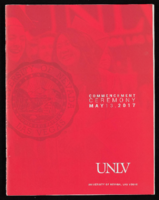
University of Nevada, Las Vegas (UNLV) Spring 2017 commencement program
Date
Archival Collection
Description
Commencement program from University of Nevada, Las Vegas Commencement Programs and Graduation Lists (UA-00115).
Text
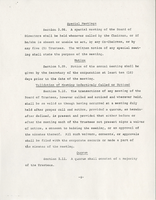
By-laws of the Nathan Adelson Hospice, November 30, 1978
Date
Archival Collection
Description
The by-laws of the Nathan Adelson Hospice establish the purpose and organization of the program, founded in 1978 in Las Vegas.
Text
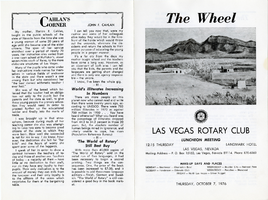
The Wheel Las Vegas Rotary Club newsletter, October 7, 1976
Date
Archival Collection
Description
Text
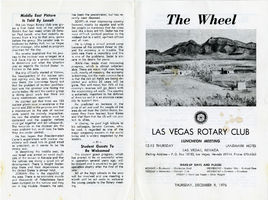
The Wheel Las Vegas Rotary Club newsletter, December 9, 1976
Date
Archival Collection
Description
Text
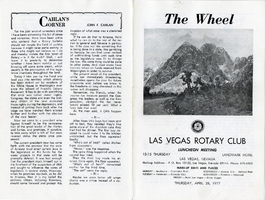
The Wheel Las Vegas Rotary Club newsletter, April 28, 1977
Date
Archival Collection
Description
Text

Transcript of interview with Chic Hecht by Julie Sefman, April 2, 1976
Date
Archival Collection
Description
Interview with Chic Hecht Julie Sefman on April 2, 1976. In this brief interview, Hecht talks about his time in the state senate working to bolster the budget with sales tax and gaming tax, starting a community college and health programs. He also talks about Pop Squires, a newspaper man and advocate for building Hoover Dam, who had a home on the site of Chic Hecht's clothing store on Fremont Street. Hecht also describes his time in the military and his involvement with the Military Intelligence Association.
Text

